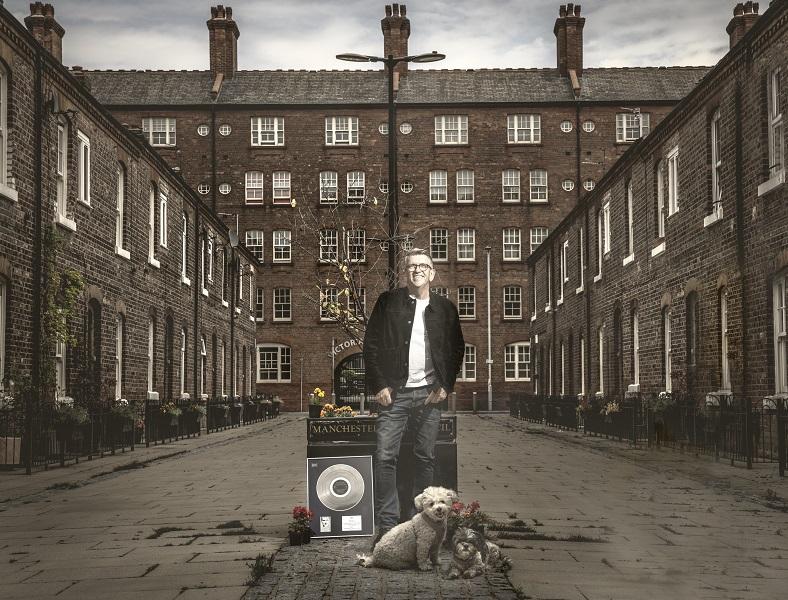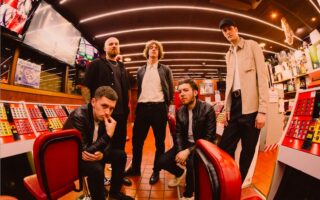
The Smiths’ Mike Joyce by Paul Husband (2022)
As he offers up his original silver disc for Back On Track, in our latest big read The Smiths’ drummer Mike Joyce takes Live4ever through the creation of an all-time classic album, the band’s split soon after, and the essential work of the charity he’s supporting.
For obvious reasons, one classic Smiths album is on everyone’s lips at the moment, but in other news (there is other news if you look hard enough), it’s been 35 years since the release of the band’s final album Strangeways, Here We Come.
Arguably their finest hour (although in a short career with no discernible low points, that’s subjective), its broad palette of sounds saw the foursome burn brighter than ever. Sadly, it would be defined as a posthumous release in late 1987, an epitaph for one of the decade’s best bands.
While it would be uncharacteristic of Stephen Patrick Morrissey to commemorate the event – and Johnny Marr rarely, if ever, looks back – one member of the group has opted for an unusual, but incredibly worthy form of celebration.
As a patron of Manchester charity Back On Track, Mike Joyce has set up a raffle for £5 per ticket with the possibility of winning his own silver disc of the album.
Speaking with Live4ever this week, Joyce explained his reasoning, some background on the charity, how he feels about the album and much more.
“I was asked to be a patron of Back On Track a few years ago. I did a couple of things for them because I thought, ‘What exactly is a patron? What does a patron do? What’s required of them?’.”
“With them being a charity, what I just wanted was to raise some money for them and raise people’s awareness of the charity itself, because I didn’t even know they existed until they asked me.”
“I went down to a few open days, and the work that they do there is absolutely invaluable. It does what it says on the tin: it gets people back on track, whether it’s through homelessness, rehousing people that have fallen by the wayside for whatever reason.”
“People with mental health problems, alcohol problems, drug problems…anything where people are struggling to get back on the first rung of the ladder. Back On Track provides all the services for these people to do that.”
“When I went down there I was listening to some of the testimonies from people on the open days. It was quite upsetting listening to the situations they’d been in, but so uplifting in the fact that their lives have changed because of the charity.”
“I think it was because it was that kind of proximity to it. You know when you give money to a charity, or you give a quid to the guy on the street or whatever, it’s very rare you actually see the results of that.”
I listened to these people about how it’s literally saved their lives, rather than it just ‘helped me here and there’. It did save the lives of these people and there’s a great communal feeling in the buildings.
“They sit down, have a coffee or a tea when they’re not working and trying to further themselves. Even that, sitting down in a room full of people and having a brew, we all take for granted. Something as simple as sitting down and chewing the fat. Some of these folks have been at absolute rock-bottom in a situation where they can’t get out, and they’ve managed to do that and change their lives.”
Having seen its effect first-hand, Joyce was inspired to act: “After COVID and lockdowns etc, and with it being a charity, a lot of the companies that were helping Back On Track went under and some of them didn’t have the finances to be able to help.”
“We raffled a disc before and we raised a lot of money and it really did help the charity. Obviously any donations of any size help, but it was great to know that I’d helped them to be able to function. So I thought I’d do it again.”
“What with it being the 35th anniversary of the release of Strangeways, Here We Come I thought it would be nice if we auctioned it.”
“Someone might come in with a huge bid which would be great because we’d generate a lot of money, but it would put off a lot of people in having the chance to own the disc.”
“We thought £5 a ticket and anybody in the world can enter. Everybody has the same chance of owning it and the draw of the raffle will be on the 35th anniversary of its release: 28th September.”
Just a reminder: it’s one hell of a prize. A one-off item from a member of the band who created a seminal album. Our talk turns to the album itself, and Joyce is frank with Live4ever when asked if he was surprised at the legacy Strangeways… has.
“Anybody that’s been in a band would be a liar if they said they wouldn’t hope for that. I wouldn’t say it’s taken me by surprise, because from the very first time I walked into that rehearsal room and met Dale (Hibbert, original bassist), Johnny and Morrissey, and listened to what they were playing and played with them, I knew it was very special.”
“I think we only played for about an hour and I knew it sounded very different and good. When we recorded Hand In Glove I remember sitting there and listening back through the speakers thinking, ‘What is this? What is it?’.”
“It defies a genre or a style; it sounded like The Smiths. It didn’t sound like anything else. Very simple: bass, drums, guitar vocals. No histrionics, no keyboards, backing vocals, sax player.”
“Then when we got to Strangeways, Here We Come…I listen to that album and it asks more questions than it answers because of the sound of the songs. The sound of the songs were nothing I’d ever heard before. I think that’s why a lot of people like it and, hopefully, that’s what it gives it a timeless feel. It wasn’t from the 1980s.”
“There was an album released a couple of years ago called The Best Of The 80s. The Cure were on it, Depeche Mode, The Human League, Heaven 17, Culture Club, every band, but The Smiths weren’t.”
“I found that quite interesting because we were slap bang in the middle of the 1980s, but we were nothing to do with the 1980s. I think that’s testament to the kind of music we made and the sounds that we made.”
It could have been in the 1960s or released now and it would still resonate. In my opinion, that’s why it still resonates with young people listening for the first time, because it’s not a very 80s sounding album. It’s a very Smiths sounding album.
In researching for the interview, Live4ever found an interview from the time in which Joyce described the experience as a ‘white knuckle ride’.
Understandably, 35 years on he struggles to recall saying as much: “I don’t remember saying that, but I don’t mind it being attributed to me at all!”
“Anytime we did go in the studio it was, but I think the others were more of a ride. I felt, as a player, I was leagues behind Johnny and Andy in terms of their proficiency. They were best friends of mine and I wanted to impress them as much as I could.”
“With the last album I felt more comfortable than I did on any of the others. Collectively we’d got to a point where we didn’t have to prove anything to anybody. When you go in to record an album that’s important.”
“Also, it’s like the second album dilemma; people say it’s difficult because the first album songs had been written over a number of years and that’s all you have, that’s why people like you.”
“You don’t want it to be too diverse from the first album because then you’ll alienate all those people who bought it in the first place, but you want it to be different because then the critics will say, ‘It’s just the same as the first album!’.”
“Strangeways… was a massive departure from anything we’d done before. What stands out to me on that album is that Morrissey, Andy and Johnny were all on fire, but Johnny in particular.”
“He’d sit down at the emulator, and to watch him…there was a genius at work there. ‘When did you learn to do that? Hold on a minute!’. It’s not as if he’d gone away for 2/3 years!”
That’s where the genius of Johnny shines through because he didn’t learn to do that, he just did it. In the same way that people talked about Brian Jones, who could pick up anything and make it sound wonderful, Johnny would make anything sound wonderful.
“And he was a kid, just a young lad! To do that and create an album musically of that importance, uniqueness and beauty…that is really something else.”
Strangeways, Here We Come was recorded in the spring of 1987, but by the time of its release that autumn Marr had left the band and The Smiths had, to all intents and purposes, split up.
Since then, the circumstances have dictated the narrative, with the (false) perception being that it was a tumultuous final act. Joyce remembers things differently:
“There was definitely a more relaxed atmosphere in the studio while recording, I found. That comes through in the playing and the music.”
“It’s easy to look at it in retrospect. If we’d have gone for another 10 years people would have said, ‘You can hear the relaxed atmosphere in Strangeways, you could tell it was going to go on for another 10 years’.”
“Obviously with what happened afterwards it’s easy to say, ‘You can tell, there’s a frisson in there. It was obvious to everybody it was going to be the last album’. Not at all.”
“It was fun for the whole album. There was a freedom, for me personally. Johnny and Andy are such great players that they can sit around and do it all day.”
“For me, with drums, I’ve got to feel comfortable. I’ve got a drum kit in the basement and sometimes I don’t play for a week or two and I get really frustrated, but it’s because I don’t have the desire to play.”
“It’s like giving a pen to an author and telling them to write a book. If they’re not inspired, they can’t, or won’t do it. That’s how I feel about playing the drums and it’s the same now.”
“I’m working with a guy called Rick Hornby at the moment and we’re writing some cracking stuff, but sometimes I won’t go downstairs for a couple of days. It’s just because I’m not inspired to. When you book that studio time and go in there for those 2 or 3 weeks, you have to be. You can’t say, ‘I’m not feeling it this week’. That can’t happen.”
“I felt so comfortable with the sound, the people I was with and the atmosphere in the studio, it brought out the best in me, like it does with anybody.”
“Whether a footballer or a musician, when you’re feeling good you’ll perform better, no matter what you’re doing. I can only speak for myself, but I did feel quite comfortable and inspired with what I was hearing and the tracks Johnny was writing.”
“That’s where it comes from first, and when Johnny was presenting us with those absolute storming tunes I felt pressure, but it was good pressure because I was inspired to contribute the best that I could. It worked for me and I’m incredibly happy with that. It is a great swansong.”
Joyce is sanguine about the circumstances on the band’s dissolution: “When we had that meeting down in London and Johnny told us he was going to leave the band, I said – what I found out since was the wrong thing – ‘Can’t we just do one more album?’, because I was scared and I wanted to stay with that band forever.”
“Andy and Morrissey did too. When you think about it, regardless of when the end point would have come, we would have split up at some point. Rather than making an album that wasn’t great, would it have happened? No-one will ever know.”
“But in terms of burning brightly for such a time, and you don’t want to be going through the ashes and burning the embers with a bit of kindling, trying to recreate something we’d done in the past. To go out with an album of such power…”
“Last Night I Dreamt That Somebody Loved Me is one of the best things I’ve ever heard. Of course I’m going to be biased, but I’ve got quite teary when I’ve listened to it, because it’s so powerful.”
“It’s an immense song. Whether you like The Smiths or not, you’ve got to respect that the four of us created that with nothing on the paper before we recorded. We worked and came up with something that sounds incredible.”
Although it was Marr who set the chain of events for their split in motion, Joyce holds no grudges and, indeed, his respect for his former bandmates permeates his tone.
“You can’t keep somebody in a relationship that doesn’t want to be there. Obviously when it was broached, I was shocked and upset. I didn’t want it to end.”
“I was never angry or bitter, just frustrated, upset and baffled. But Johnny wants to do what he wants to do, and he does it very well.”
It’s not something that I’ll ever hold against him in any way whatsoever. It was something he wanted to do at the time and I disagreed with him but, again, the analogy is the relationship – ‘I want to end it’, ‘Well, I don’t’, ‘Yeah, but you’re not me’. I was a bit nonplussed, but if that was the right thing for him, good on him.
“It’s not as if he stopped playing, he’s never stopped. That was prevalent in The Smiths. We saw each other 365 days a year in The Smiths.”
“Every single day I’d go round and every day he had a guitar strapped round him. When I’d leave, it’d be 2, 3 in the morning, and he’d still have the guitar strapped to his neck.”
“He’s a very gifted machine. He doesn’t go and play the guitar, he’s playing the guitar all the time in his head, I think. It’s just what he does. It’s not a career or a job, he lives, breathes and absolutely obsesses. He’s obsessed with his clobber too!”
After The Smiths’ demise, Morrissey immediately embarked upon a new venture with the band’s longtime producer Stephen Street, as well as Joyce and Rourke.
Although it eventually led to a solo career for the singer, Joyce did play on some of his early material, including the singles Interesting Drug and The Last Of The Famous International Playboys.
“One quarter of what I loved was taken away, but I still had three quarters left, so that was the logical thing. It didn’t affect my love of Morrissey’s word or his artistry as a frontperson.”
“Sleeve design, lyrics, everything. Same with Andy, my best friend really. The best bass player I’ve ever worked with. It made no sense to me to look elsewhere, with the addition of Craig (Gannon, touring Smiths guitarist).”
“Another stunning guitarist and great guy, another person I had a lot of time for. I’ve got to be on the same friendship level with people and that intensity with them so when we do play it’s personal. But it was a really good couple of years, I really enjoyed it. I liked what we created and it was worth hanging around to do that.”
Our talk turns to Joyce’s varied career since the late 1980s: in the 1990s he and Paul ‘Bonehead’ Arthurs dallied with the idea of a band, but unfortunately the idea failed to ignite for various reasons.
“I met Bonehead when Oasis played in Dublin. I went over to see them, then he moved in to a place near me. I was thrilled to meet him; he was lovely and we started hanging out and playing together. It was lovely working with Bone, a good guy and one of the music industry’s good people.”
“I’m still friends with him and I’ve got a lot of time for him as a good mate. The playing together is an add-on. We tried a few things but it didn’t really happen. We couldn’t sort out band members getting it together. It sounded good but we just didn’t catch it right, but that happens. I’ve done it with other musicians and for whatever reason, it doesn’t happen.”
What’s striking when speaking with Mike Joyce is his unparalleled enthusiasm. He’s equally as excited talking about the future as he is about the past, specifically his current project.
“I’ve known Rick Hornsby for about 20 years. He moved back up to Manchester from London last year and he said, ‘Do you want to do a bit of playing?’ and I said, ‘I’d love to’.”
“We started having a play and it really wasn’t anything other than that. I just realised that was I wanted to do; it was very organic.”
We started playing and it was, ‘Hold on a minute, this is really good!’. We’ve been demoing stuff. I met a super-talented singer from San Francisco earlier this year and we’re going to do a collaboration with him. I can’t wait for this. It’s going to be really good.
“I played with Aziz Ibrahim and we had some great times but again, it didn’t come to fruition. But with this, I’ve got a really good feeling. This could be something very interesting. Watch this space! We’re going to record first and go from there, but I think it’s going to be really good.”
But that’s for the future, and the immediate concern is his raffle with Back On Track. Demonstrating the thought and care that has gone into this exercise, Joyce was careful to cap the price per ticket at a reasonable amount.
“I’m trying to generate as much money as I can for this brilliant cause, and it goes without saying that it would be great if that ticket came out for a die-hard Smiths fan.”
“But in terms of wanting to get people to buy a ticket; even if you’re not a Smiths fan and you buy the raffle ticket and you’re the winner, it’s worth a lot of money. Then it can be sold on.”
“Even giving up that opportunity, and to just say, ‘Even if you’re not a Smiths fan, buy it’, is not the way I want to go, but I want to generate as much money as I can. Even if you’re not interested and just share something on social media, that would help.”
You heard the man. Dig deep, get sharing, do what you can. Times are tough but it’s always tougher for someone else, and this gesture from one of music’s pioneers deserves all the attention it can possibly get.
Tickets for the charity raffle in aid of Back On Track are available to purchase at this link.




